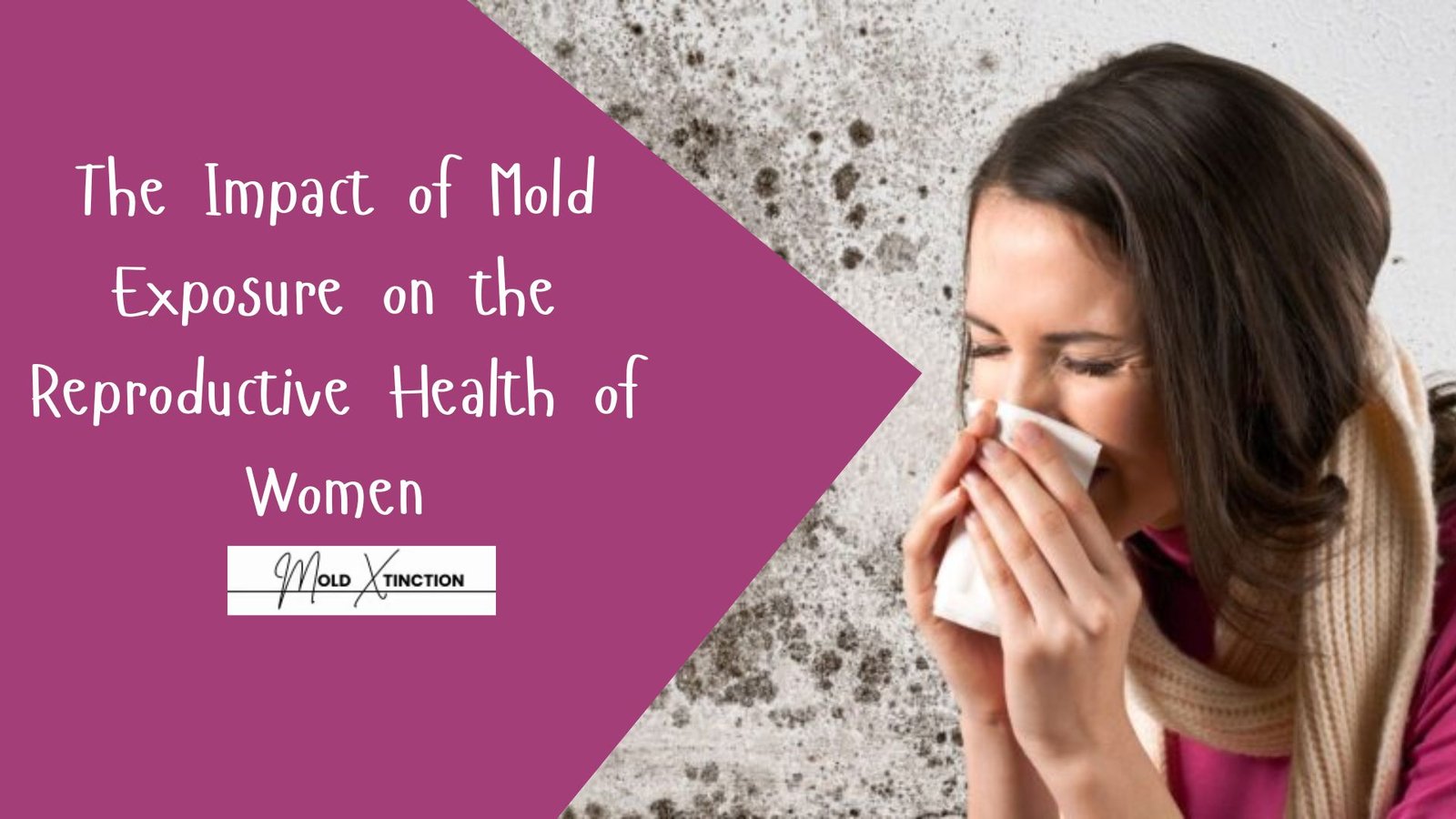Women who know the impact of mold exposure on the reproductive health of women will never play with mold once they find it.
Mold is a silent killer and it’s in your homes and schools and even in your offices. Whenever we talk of mold most of us think of coughing, sneezing or even skin rashes. But mold is not that superficial. It’s not just appearing it can get deep into your body and affect your well-being in ways you never thought of.
Another intimate and valuable thing women can get ruined because of mold is reproductive health. This includes being on your period, pregnant and even child delivery. This is a big problem that needs to be addressed.
This article will guide you on how mold affects the reproductive systems of women. We will break it down in a way that’s easy to read even for a layman who’s not in the field of science. And most importantly we will tell you what to do to stay safe and healthy.
Why Should Women Worry About Mold?
Mold’s reactions are more intense in women. This is because of the way their bodies react to some hormones. There are two big type of hormones, estrogen and progesterone that increases body sensitivity to mold toxin.
In cases where these hormones are active in our body then the immune system may be irritable to any exposure to molds.
Mold can also interact with these hormones in a bad way which can lead to more serious health issues over time.
How mold affects hormone levels in women makes their reaction to mold stronger and sometimes longer-lasting.
This can vary from person to person but women are more at risk. The connection between mold, hormones and immune response is something we need to understand better.
Pay attention to how mold affects the body especially if you have ongoing symptoms or repeated exposure.
The problems that may be caused by mold in reproductive health if there’s a mold problem may include:
- Irregular periods
- Trouble getting pregnant
- Early menopause
- Miscarriage
- Birth defects in babies
So let’s look at them in detail now.
The Impact of Mold Exposure on the Reproductive Health of Women

1. Irregular Menstrual Cycles
Hormonal imbalance is one of the cases that may happen when you are exposed to mold. Mycotoxins are toxicants that are released by mold and may lead to interference in the hormonal body regulation.
The toxins may weaken the ovaries to work and generate major hormones in the body such as estrogen and progesterone. The disorder of these hormones may alter the body functions.
Mold in your surroundings can keep on interfering with this balance. Over time the effects can get worse if the exposure is high and not taken care of or eliminated.
Once these hormones are imbalanced you might experience:
- Missed periods
- Heavy bleeding
- Shorter or longer cycles
At first this can be taken as a minor issue. But if mold continues to grow in your home, this will get worse over time.
2. Fertility Problems
Do you know that mold can cause some serious issues that may prevent you from getting pregnant? Mold is in the way.
Women exposed to mold for a long time often report:
- Difficulty ovulating
- Uterine inflammation
- Weakened immune systemSince the immune system will be busy fighting off the mold toxins every time, it won’t help support a healthy pregnancy. Mold can also reduce healthy eggs in the ovaries. That’s tough.
3. Miscarriage
There are indications that mold (black mold, especially) can increase the chances of miscarriage in a pregnant woman to rise. An exposure to the mold causes the body to think it’s a threat and as such it goes into defense mode.
Such an immune response can complicate the body’s supporting and protecting a pregnancy. The placenta can be damaged by mycotoxins which are toxic ingredients released by molds.
The placenta is very important in feeding and providing oxygen to the baby. When it’s damaged the baby will lack of oxygen or nutrients.
This is a recipe for big trouble especially during the first months of pregnancy and may result to miscarriage.
4. Birth Defects and Pregnancy Complications
When a woman is pregnant and is exposed to mold the baby is at risk. What’s possible is that the mold toxins get through the placenta and to the baby.This means that anything that hurts the mother will hurt the unborn baby. If these toxins affect the flow of nutrients or oxygen then they may cause developmental issues to the baby.
No mother wants to harm her child. That’s why mold exposure during pregnancy deserves attention.
Even with limited exposure, precautions should be taken so the mother is not affected and the baby is not at risk too.
Possible complications:
- Low birth weight
- Premature birth
- Developmental delays
- Brain and lung problems.
5. Early Menopause
Menopause happens between 45-55 years old. But exposure to mold in women can cause early menopause. Why? Mold is unhealthy to the ovary and can disrupt the production of body hormones.
Estrogen is important and can be destroyed prematurely when it’s destroyed in the ovaries. This sudden change can bring about premenopausal symptoms like night sweats, hot flashes and mood swing. The symptoms can be as early as before expected age.
Menopause can harm a woman’s overall health that’s why one should avoid molds and balance the hormones in the body.
Besides the fact that early menopause ends pregnancy, it also subjects a person to:
- Heart disease
- Thinning bones (osteoporosis)
- Depression
6. Chronic Fatigue and Reproductive Stress
Women exposed to mold are tired. Not like normal tiredness but the exhausting kind that you can’t shake off even after resting.
Being tired all the time your mind and body respond to that; your mood, your hormones and your desire to make love is also affected. Stress levels increase. Relationships are prone to be impaired. Your whole reproductive system is disrupted.
7. Worsened Endometriosis and PCOS Symptoms
If you already have PCOS (Polycystic Ovary Syndrome) or Endometriosis, mold can exacerbate them. Hormone problems are already associated with these conditions. Mycotoxins can shift your body even further out of balance resulting to:
- More pain
- Heavier bleeding
- Worse acne or hair growth
- Increased infertility riskIf you have these conditions, keeping your home mold-free is even more important.
Where Mold Hides in Your Home
You may not see mold but that doesn’t mean it’s not there. Mold loves:
- Behind walls
- Under sinks
- Around windows
- Inside air conditioners
- In carpets and floorboards
You might already have a mold problem so if the home has a musty odor to it or you notice any black, green or white stains in the house then you have a problem.
What to Do If You Think Mold
If you think mold is affecting your health or fertility, don’t ignore it. Here’s what to do:1. See a doctor: Tell your symptoms. Mention you were in a wet house with moulds.
- Never clean it yourself: When you scrub mould it releases more spores in the air. This makes it worse.
- Get a professional mold removal company: This is the best and safest way to kill mould.
Stay Safe and Your Family
Your health and your family’s future is too precious to risk.
Here are the easy ways to avoid mold:
- Fix leaks fast
- Place exhaust fans in the kitchen and in the bathrooms
- Humidity should be below 50%
- Carefree cleaning in 2448 hours
- Test dehumidifiers and air conditioners regularly
It’s more important to do these when you’re pregnant or trying to get pregnant.
Helpful Guide: How Mold in Homes Affects children’s School Attendance
Conclusion
Your home is supposed to be a safe haven–not a ticking time bomb of health hazards. Though invisible, mold can be a big problem for a woman especially when it comes to reproduction. The effects of mold exposure can be severe and permanent from missed periods to miscarriage and infertility.
When you and/or your loved ones are having health issues of any kind and mold could be the culprit, don’t wait. ACT! now.
Order a professional mold remediation service now. They have the right equipment and knowledge to find the mold, get it out and prevent its regrowth.
It’s all worth it to your health, your future and your peace of mind.
FAQs
1. Does it influence female fertility as a result of exposure to moulds?
Yes, allergic effects may include fertility disorders caused by exposure to mold. Some kinds of moulds have toxins that can change hormone levels and cause sterility.
2. Will mold harm the newborns before birth?
Yes, that’s why pregnant women should try as much as possible to avoid ma old environment. Just the inhalation of any mold causes fatigue, headaches, or in extreme cases, damage to the unborn fetus.
3. How destructive is mold to menstruation cycle?
Toxins can change the body hormones due to molds. These can lead to missed dates or missed periods or severe symptoms such as missed periods.
4. What are the signs of mold that affects a woman’s health?
Fatigue, rashes on the skin, headaches and breathing difficulties are some of the symptoms. When these happen regularly in a wet and moldy environment then the reason might be mold.


